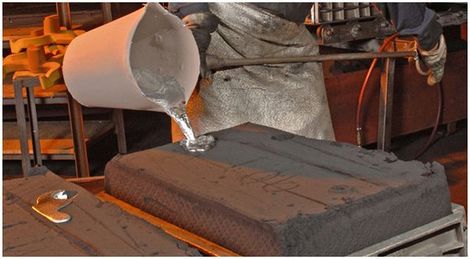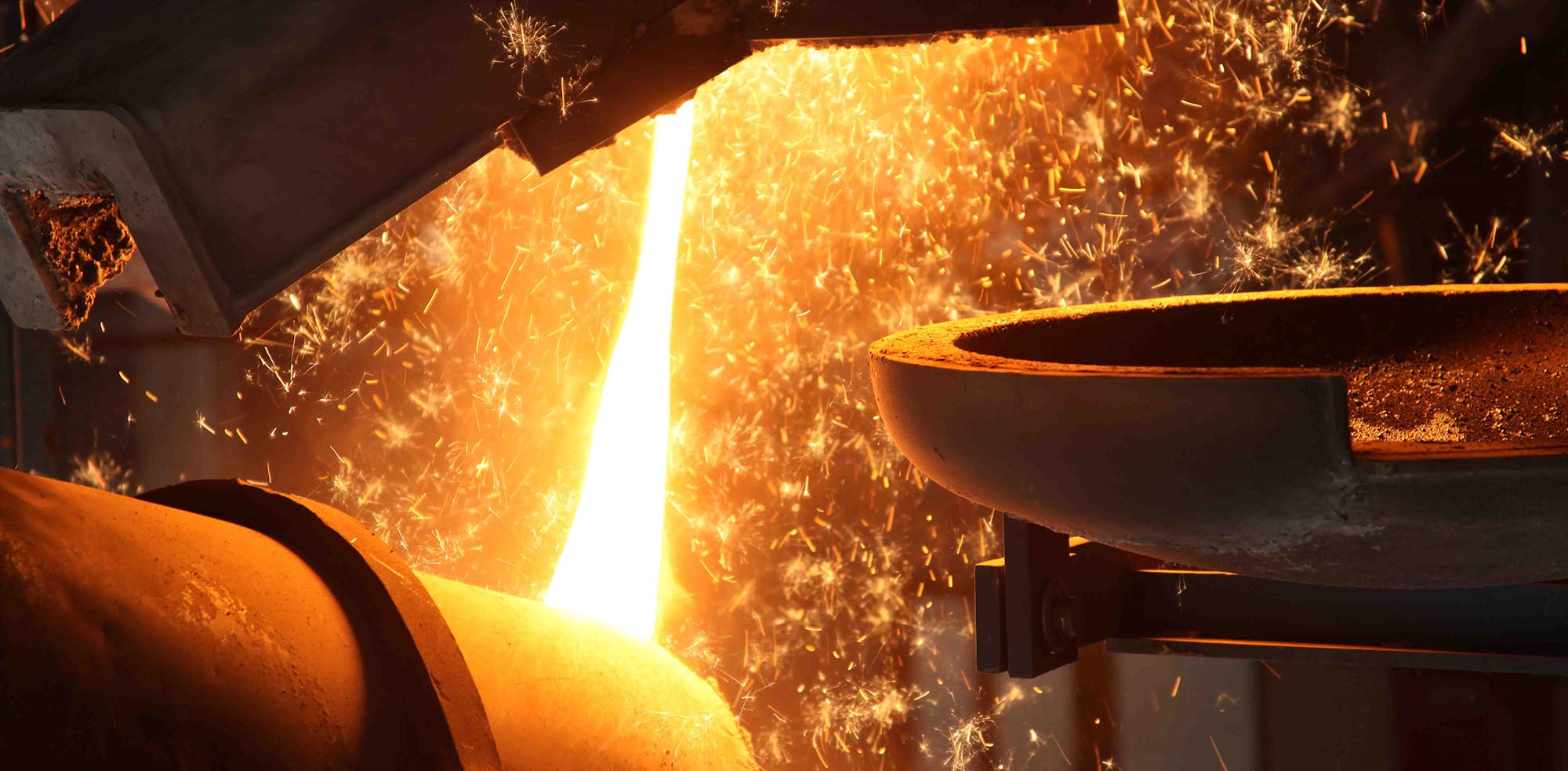Just How a Metal Foundry Adds to Sustainable Metal Production Practices
Metal foundries play a vital role in advertising sustainability within the metal manufacturing market. By including recycled materials, they minimize dependence on virgin resources and lessen ecological impacts. Energy-efficient melting processes additionally decrease energy usage and emissions. The journey toward lasting practices includes more than just recycling and energy monitoring. It encompasses a wider commitment to honest sourcing and innovative technologies. The effects of these techniques are considerable and warrant better evaluation.
The Function of Recycling in Metal Foundries
While metal production has typically relied upon virgin materials, the enhancing focus on sustainability has brought about a substantial change in practices, especially in metal foundries. Recycling has emerged as an important component of this makeover, permitting foundries to repurpose scrap metal and minimize dependence on mined resources. By integrating recycled materials into their procedures, foundries not only lower environmental influence however also reduced manufacturing expenses.
Making use of recycled steels, such as steel, copper, and aluminum, decreases energy intake and lowers greenhouse gas discharges linked with conventional mining and refining techniques. Foundries can attain high-quality outputs by employing advanced sorting and processing innovations to assure the pureness of recycled materials. This emphasis on reusing fosters a circular economic climate, where waste is minimized, and resources are made use of efficiently. Metal foundries play a crucial role in advertising sustainable techniques within the metal production industry.
Energy-Efficient Melting Techniques
Energy-efficient melting techniques are vital for improving sustainability in metal production. These techniques considerably minimize energy consumption during the melting procedure, which is just one of one of the most energy-intensive stages in metal manufacturing. Technologies such as induction melting, resistance home heating, and microwave melting deal enhanced efficiency contrasted to standard methods. Induction melting, for instance, makes use of electromagnetic areas to produce warm directly within the metal, reducing power loss and supplying accurate temperature level control.
In addition, implementing warm recovery systems can better enhance performance by catching and reusing waste warm generated throughout melting. Using advanced insulation products and enhancing heating system designs additionally add to power cost savings. By embracing these cutting-edge melting strategies, metal foundries can lower their carbon footprint, reduce operational costs, and add to a much more sustainable manufacturing landscape. The combination of energy-efficient methods not only straightens with environmental objectives yet additionally meets the growing demand for accountable manufacturing methods in the metal industry.
Sustainable Sourcing of Raw Materials
Sustainable sourcing of resources is crucial for minimizing the environmental influence of metal production. This involves the enhanced use of recycled metals, the fostering of ethical mining practices, and campaigns intended at local sourcing. By focusing on these techniques, the industry can advertise responsible resource administration and support local economies.

Recycled Metal Utilization
Exactly how can sectors efficiently reduce their ecological impact while fulfilling the expanding demand for metal? One significant strategy is the application of recycled metal. By incorporating scrap metal right into their manufacturing procedures, foundries can decrease the removal of virgin products, consequently reducing and preserving all-natural sources power consumption. Recycled metals need less power to procedure compared to their raw equivalents, leading to reduced greenhouse gas exhausts. Additionally, using recycled metal aids divert waste from land fills, promoting a round economic climate. Industries that prioritize recycled metal not just add to sustainability but also take advantage of expense savings connected with minimized material procurement. Recycled metal application stands as a crucial approach for ecologically liable metal production.
Ethical Mining Practices
While the need for steels remains to climb, markets are progressively recognizing the significance of ethical mining practices in making certain responsible sourcing of resources. Ethical mining incorporates a commitment to ecological stewardship, social responsibility, and adherence to reasonable labor techniques. Firms are currently prioritizing collaborations with mines that demonstrate openness in their operations, minimizing eco-friendly effect and respecting neighborhood areas. This method not just cultivates a lasting supply chain but also improves the credibility of organizations entailed. By applying extensive criteria and certifications, markets can deal with prohibited mining activities and promote the well-being of workers. Eventually, honest mining methods contribute significantly to a much more lasting metal production ecosystem, aligning economic development with environmental and social integrity.
Local Sourcing Campaigns

Developments in Metal Casting Processes
Technologies in metal casting processes are transforming the industry by including sophisticated recycling techniques that minimize waste. Energy-efficient melting approaches are additionally being created to reduce energy intake during manufacturing. Furthermore, using innovative mold materials contributes to improved efficiency and sustainability in casting procedures.
Advanced Recycling Techniques
Advanced recycling strategies are transforming metal casting procedures, considerably improving sustainability in the market. These developments focus on reclaiming and recycling scrap metal, considerably minimizing waste and the need for virgin products. Strategies such as hydrometallurgy and pyrometallurgy enable foundries to extract important metals from used elements, making sure efficient source usage. Additionally, progressed sorting and filtration innovations boost the high quality of recycled metals, making them appropriate for high-performance applications. This not only minimizes the environmental footprint of metal manufacturing yet additionally fosters a circular economy by promoting the reuse of products. As these recycling approaches remain to advance, they promise to better simplify operations within foundries and add to a much more sustainable metal production landscape.
Energy-Efficient Melting Methods
While conventional melting techniques have long been the backbone of metal casting, current developments have actually introduced energy-efficient techniques that markedly minimize power consumption and emissions. Technologies such as induction melting and electrical visit homepage arc heating systems have actually obtained prestige, allowing for accurate control over temperature level and reducing the need for fossil gas. These approaches not just boost power performance but likewise advertise quicker melting times, which converts to decrease functional prices. Additionally, advancements in warm healing systems allow foundries to record and recycle excess warmth created throughout the melting procedure. This all natural approach to power monitoring not just supports sustainable techniques but also placements metal foundries as leaders in the change towards greener production processes, even more lining up with global sustainability objectives.
Innovative Mold Products
As the need for more reliable and sustainable metal casting procedures grows, the exploration of ingenious mold and mildew materials has ended up being a focal point in the sector. Typical mold materials commonly add to environmental difficulties, prompting the look for choices that minimize waste and energy intake. Current improvements include the development of recyclable compounds and biodegradable binders, which not just improve mold efficiency however also minimize environmental impact. In addition, making use of 3D printing technology in mold and mildew development permits detailed styles that reduce product use and enable quick prototyping. These ingenious products not only boost casting accuracy yet likewise align with sustainability objectives, find out here now showcasing the industry's dedication to reducing its carbon impact while maintaining high-quality manufacturing criteria.
Minimizing Waste Through Advanced Modern Technology
Innovative innovations are changing the metal manufacturing market by substantially reducing waste and enhancing efficiency. Advanced data analytics and maker understanding formulas enable foundries to optimize production processes, identifying inadequacies and minimizing scrap material. Smart sensors monitor equipment performance in real-time, enabling view it for predictive maintenance that minimizes downtime and waste generation. In addition, additive production strategies, such as 3D printing, permit for the production of complicated parts with marginal product usage, significantly lowering waste contrasted to conventional approaches.
Additionally, closed-loop systems are coming to be much more widespread, in which scrap metal and results are recycled back into the production cycle, ensuring that products are used to their fullest potential - Metal Casting. This assimilation of innovation not only promotes source conservation yet also enhances the total sustainability of metal manufacturing techniques. By embracing these innovations, foundries can add to a much more lasting future while preserving competition in the marketplace
The Effect of Foundries on Carbon Footprint Decrease
Foundries play an important duty in decreasing the carbon impact of the metal production market by implementing numerous sustainable methods. By making use of energy-efficient innovations, such as electrical arc furnaces, these centers substantially lower greenhouse gas emissions contrasted to traditional techniques. In addition, foundries increasingly embrace renewable energy resources, which additionally lessens their reliance on fossil gas.
Reusing scrap metal is another important technique that foundries employ, saving sources and reducing the requirement for virgin products. This not just lessens waste but additionally lowers the energy-intensive extraction processes connected with mining. Additionally, the adoption of closed-loop water systems assists to lessen water use and reduce wastewater discharge, adding to a more sustainable operation.
With these campaigns, foundries show their dedication to ecological stewardship, leading to a marked reduction in the overall carbon impact of the metal manufacturing field. Their ongoing initiatives are pivotal in the shift towards a more sustainable industrial landscape.
Frequently Asked Inquiries
What Kinds of Metals Are The Majority Of Commonly Recycled in Foundries?
Aluminum, copper, steel, and brass are amongst one of the most frequently recycled metals in foundries. These metals are favored as a result of their high recycling prices, economic value, and widespread schedule, adding considerably to industrial sustainability efforts.
Just How Do Foundries Make Certain the Top Quality of Recycled Materials?
Foundries determine the quality of recycled materials with rigorous testing, arranging, and filtration procedures. They apply sophisticated modern technologies to examine composition and remove impurities, ensuring that the recycled steels satisfy sector requirements for efficiency and safety.
What Qualifications Exist for Lasting Foundry Practices?
Different qualifications exist for lasting foundry methods, including ISO 14001 for ecological administration, ISO 50001 for energy administration, and LEED certification for lasting building techniques (Metal Foundry). These qualifications assist guarantee adherence to ecological and sustainability criteria in operations
Just How Do Foundries Determine Their Carbon Footprint Reduction?
Foundries determine carbon impact reduction via tools like lifecycle analyses, energy audits, and discharges tracking systems. They contrast baseline discharges to existing outputs, examining renovations in energy effectiveness, product usage, and renewable resource fostering in time.
What Are the Financial Advantages of Lasting Metal Production?
Lasting metal manufacturing supplies economic benefits such as minimized functional costs, boosted performance, enhanced market competitiveness, and possible government rewards. In addition, it fosters innovation and attracts ecologically mindful customers, inevitably driving lasting profitability for businesses.
Metal foundries play an essential role in promoting sustainability within the metal production industry. While metal production has typically depended on virgin materials, the enhancing emphasis on sustainability has led to a considerable shift in methods, especially in metal foundries. By integrating scrap metal into their production processes, foundries can decrease the extraction of virgin products, therefore conserving all-natural sources and reducing energy usage. Foundries play a necessary duty in reducing the carbon impact of the metal manufacturing market by executing various sustainable techniques. Reusing scrap metal is an additional crucial method that foundries utilize, conserving resources and lowering the requirement for virgin materials.